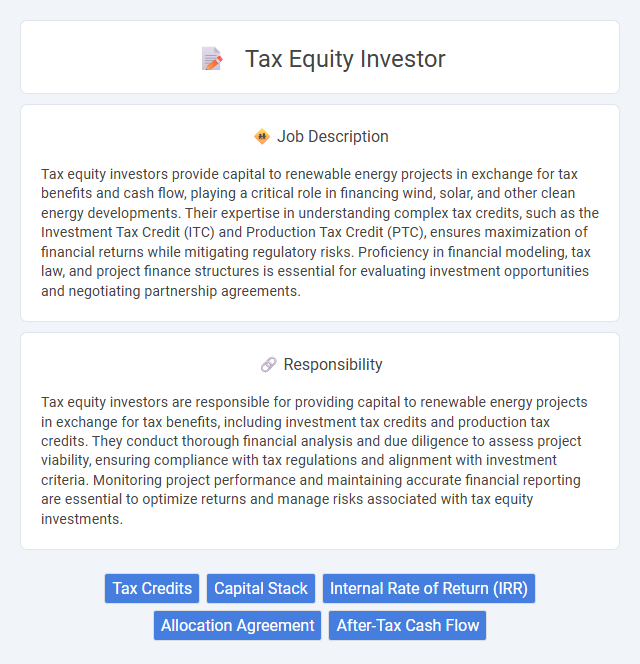
Tax equity investors provide capital to renewable energy projects in exchange for tax benefits and cash flow, playing a critical role in financing wind, solar, and other clean energy developments. Their expertise in understanding complex tax credits, such as the Investment Tax Credit (ITC) and Production Tax Credit (PTC), ensures maximization of financial returns while mitigating regulatory risks. Proficiency in financial modeling, tax law, and project finance structures is essential for evaluating investment opportunities and negotiating partnership agreements.
Individuals with strong financial analysis skills and a deep understanding of tax regulations are likely suitable for a tax equity investor role. Those comfortable navigating complex legal frameworks and adept at assessing investment risks may find this job aligns well with their capabilities. However, people who prefer straightforward, less detail-intensive work might struggle with the complexity and precision required in this position.
Qualification
A tax equity investor must possess a strong foundation in finance, tax law, and renewable energy project structuring to evaluate investment opportunities accurately. Key qualifications include expertise in tax credits such as the Investment Tax Credit (ITC) and Production Tax Credit (PTC), proficiency in financial modeling, and experience with due diligence processes. Strong analytical skills, a background in accounting or finance, and familiarity with regulatory compliance ensure effective risk assessment and optimal tax benefit realization.
Responsibility
Tax equity investors are responsible for providing capital to renewable energy projects in exchange for tax benefits, including investment tax credits and production tax credits. They conduct thorough financial analysis and due diligence to assess project viability, ensuring compliance with tax regulations and alignment with investment criteria. Monitoring project performance and maintaining accurate financial reporting are essential to optimize returns and manage risks associated with tax equity investments.
Benefit
Tax equity investor jobs likely provide significant financial benefits through access to tax credits and incentives associated with renewable energy projects. These roles often offer opportunities for portfolio diversification and reduced risk due to the stable returns generated by tax equity structures. Professionals in this field probably experience enhanced career growth as demand for sustainable investment expertise continues to rise.
Challenge
The role of a tax equity investor likely involves navigating complex regulatory frameworks and fluctuating tax policies, presenting significant challenges in risk assessment and financial modeling. Managing uncertainties in project performance and compliance requirements may require advanced analytical skills and adaptability. Balancing investment returns with evolving tax incentives could demand continuous market research and strategic decision-making.
Career Advancement
Tax equity investors specialize in financing renewable energy projects by providing capital in exchange for tax benefits and project revenue. Career advancement in this field often involves progressing from analyst roles to senior associate, vice president, and director positions within financial institutions or investment firms focused on clean energy. Developing expertise in tax credit structures, regulatory compliance, and sustainable finance enhances opportunities for leadership roles and strategic decision-making.
Key Terms
Tax Credits
Tax equity investors specialize in funding renewable energy projects to leverage federal and state tax credits, such as the Investment Tax Credit (ITC) and Production Tax Credit (PTC). Their role involves structuring partnerships and allocating tax benefits efficiently to maximize after-tax returns while mitigating investment risks. Expertise in tax law, financial modeling, and regulatory compliance is essential to ensure optimal utilization of available tax incentives.
Capital Stack
A tax equity investor plays a crucial role in renewable energy project financing by providing capital that occupies a specific layer in the capital stack, typically as mezzanine or preferred equity. This investment structure allows tax equity investors to maximize tax benefits such as Investment Tax Credits (ITCs) and Production Tax Credits (PTCs), while mitigating risks through priority returns. Understanding the position within the capital stack is essential for aligning interests between developers, sponsors, and tax equity providers to optimize project financial performance.
Internal Rate of Return (IRR)
A tax equity investor evaluates projects primarily through the Internal Rate of Return (IRR) to measure potential profitability and risk-adjusted returns. This metric is critical for assessing investments in renewable energy credits, where tax benefits significantly impact overall yield. Optimizing IRR ensures alignment with portfolio objectives while maximizing tax incentives and cash flow stability.
Allocation Agreement
A tax equity investor job involves structuring and managing financial investments in renewable energy projects by negotiating and executing allocation agreements that define the distribution of tax benefits and cash flows between project partners. The allocation agreement ensures precise allocation of tax credits, depreciation, and profits in compliance with IRS guidelines and partnership taxation rules, optimizing the investor's return while minimizing risk. Expertise in tax equity allocation agreements is essential to accurately model cash flow waterfalls and secure regulatory compliance for successful project financing.
After-Tax Cash Flow
A tax equity investor in renewable energy projects focuses on maximizing after-tax cash flow through the efficient utilization of tax credits, such as the Investment Tax Credit (ITC) or Production Tax Credit (PTC). This role involves analyzing complex financial models to optimize depreciation benefits, minimize tax liabilities, and ensure steady cash distributions post-tax. Expertise in federal and state tax regulations is critical to structuring investments that enhance after-tax returns and mitigate financial risks.
 kuljobs.com
kuljobs.com